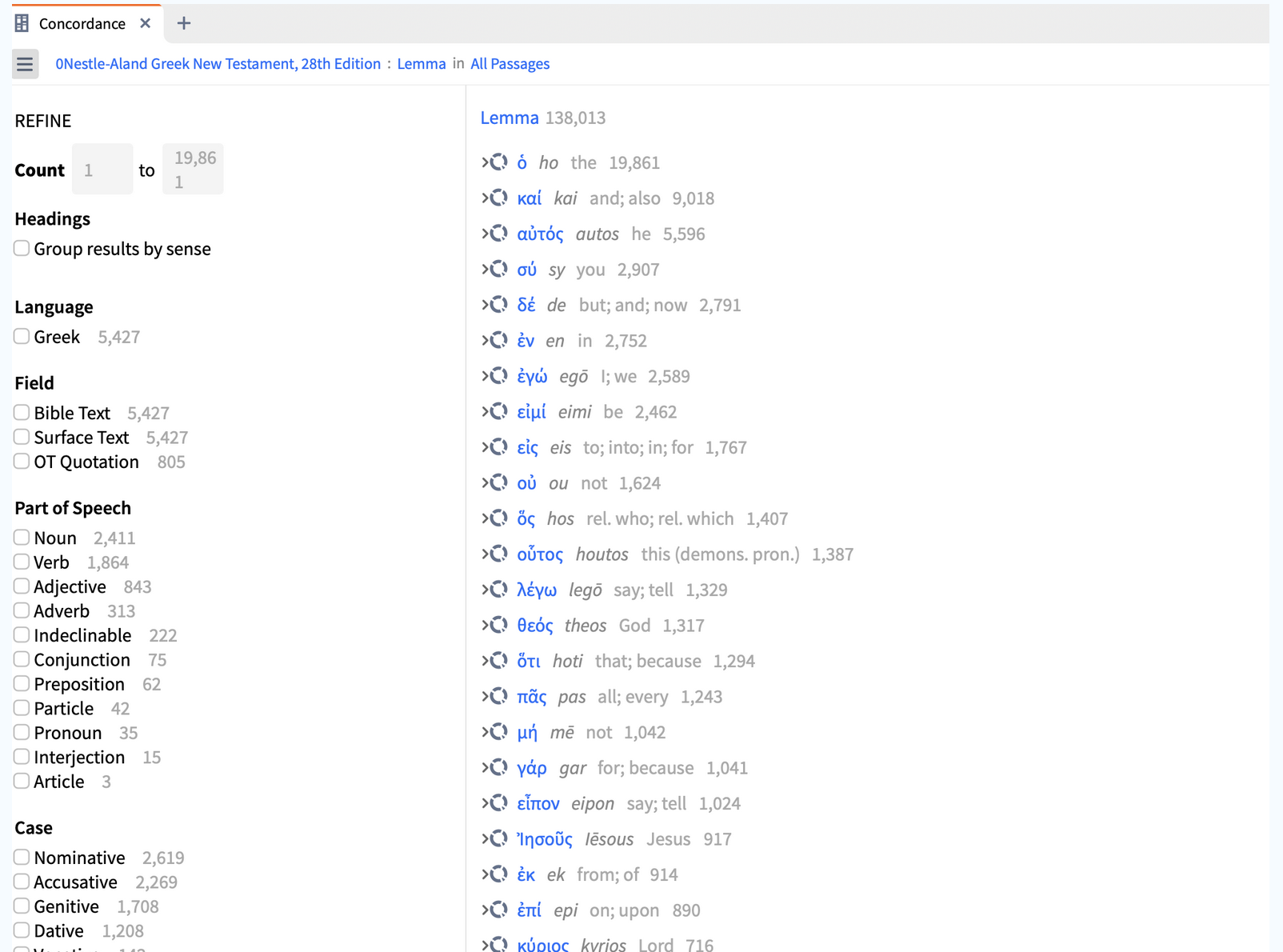 Mark 1:2
Mark 1:2

|
Strongs 2531
[list] Λογεῖον Perseus Kathōs Καθὼς Just as Adv |
|
Strongs 1125
[list] Λογεῖον Perseus gegraptai γέγραπται are written/drawn V-RIM/P-3S |
|
Strongs 1722
[list] Λογεῖον Perseus en ἐν within Prep |
|
Strongs 3588
[list] Λογεῖον Perseus tō τῷ the Art-DMS |
|
Strongs 2268
[list] Λογεῖον Perseus Ēsaia Ἠσαΐᾳ He is Liberator N-DMS |
|
Strongs 3588
[list] Λογεῖον Perseus tō τῷ the Art-DMS |
|
Strongs 4396
[list] Λογεῖον Perseus prophētē προφήτῃ prophet N-DMS |
|
Strongs 2400
[list] Λογεῖον Perseus Idou Ἰδοὺ Behold V-AMA-2S |
|
Strongs 649
[list] Λογεῖον Perseus apostellō ἀποστέλλω am sending V-PIA-1S |
|
Strongs 3588
[list] Λογεῖον Perseus ton τὸν the Art-AMS |
|
Strongs 32
[list] Λογεῖον Perseus angelon ἄγγελόν angel N-AMS |
|
Strongs 1473
[list] Λογεῖον Perseus mou μου of myself PPro-G1S |
|
Strongs 4253
[list] Λογεῖον Perseus pro πρὸ in front Prep |
|
Strongs 4383
[list] Λογεῖον Perseus prosōpou προσώπου face N-GNS |
|
Strongs 4771
[list] Λογεῖον Perseus sou σου of you PPro-G2S |
|
Strongs 3739
[list] Λογεῖον Perseus hos ὃς which/whichever RelPro-NMS |
|
Strongs 2680
[list] Λογεῖον Perseus kataskeuasei κατασκευάσει construct/arrange V-FIA-3S |
|
Strongs 3588
[list] Λογεῖον Perseus tēn τὴν the Art-AFS |
|
Strongs 3598
[list] Λογεῖον Perseus hodon ὁδόν road N-AFS |
|
Strongs 4771
[list] Λογεῖον Perseus sou σου of you PPro-G2S |
As it has been written in the prophets, Behold, I send my messenger before thy face, who shall prepare thy way before thee.
as it has been written in the Prophets, "Behold, I send My messenger before Your face, who will prepare Your way before You;
As it is written in Isaiah the prophet, “Behold, I send my messenger before your face, who will prepare your way,
Footnotes
| 1a | αὐτός The True Self Scholars always knew that the pronoun αὐτός was used "inordinately" throughout the New Testament (as in, way beyond normal usage of classical Greek), but failed to understand why. It is a word that fundamentally denotes one’s true self, often distinguishing the soul from the body (Od. 11.602) or, conversely, the body from the soul (Il. 1.4). It functions reflexively as “self” and, in oblique cases, as a personal pronoun (“him, her, it”). It emphasizes individual identity in contrast to others, such as a king vs. his subjects (Il. 6.18), Zeus vs. the other gods (Il. 8.4), or a warrior vs. his weapons (Il. 1.47). With the article (ὁ αὐτός, ἡ αὐτή, τὸ αὐτό), it signifies "the same" or "the very self." In prose, αὐτός can appear without the article for proper names (αὐτὸς Μένων, X. An. 2.1.5) and is used impersonally in phrases like αὐτὸ δείξει ("the result will show," Cratin. 177). It also expresses volition (“of one’s own accord,” Il. 17.254) or personal presence (“in person,” D. 1.2). The most frequent noun word used in the NT is not "God" (θεός), found 1,317 times, but rather αὐτός the self, found over 5,600 times. The only words more frequent are "and" (9,000 times) and "the" (20,000 times). Similarly, the most frequent word in the Old Testament Hebrew is את the eternal self, occuring over 11,000 times.
The Neuter Form In philosophical or poetic usage, particularly in Homer and Plato, the neuter form αὐτό may denote one’s true self, either the soul (Od. 11.602) or, conversely, the body (Il. 1.4), depending on context. It also appears in abstract references to essence, identity, or the very thing itself (τὸ αὐτό), as in expressions of intrinsic nature or reality (cf. Plato, Republic 362d: αὐτὸ ὃ μάλιστα ἔδει ῥηθῆναι – "the very thing that most needed to be said"). Thus, while αὐτός is not reflexive in the grammatical sense (cf. ἑαυτοῦ, "of oneself/one's own self"), it does, especially in neuter form, preserve and express a conceptual sense of "Self" or "the same being", particularly in metaphysical or emphatic contexts. in ancient Greek, αὐτό—specifically the neuter singular form of αὐτός—is the only appropriate and attested lexical item to express the metaphysical concept of "the self", especially in Platonic and post-Platonic philosophical discourse.
(cf. LSJ αὐτός) |
